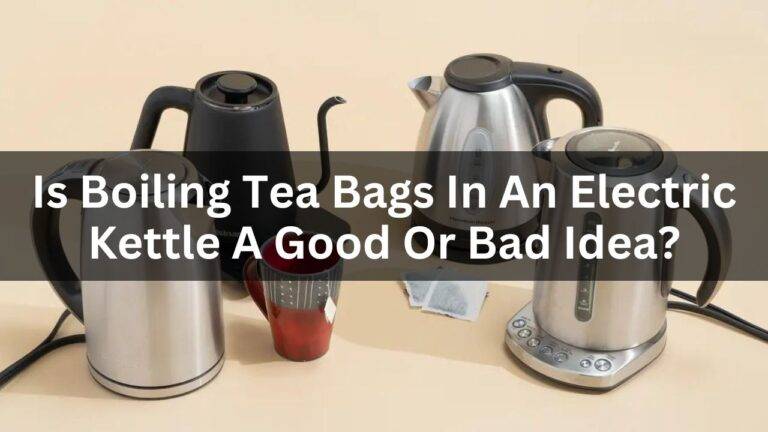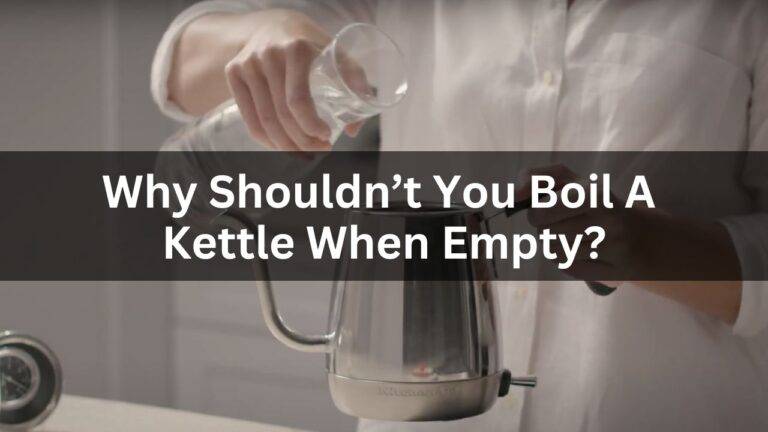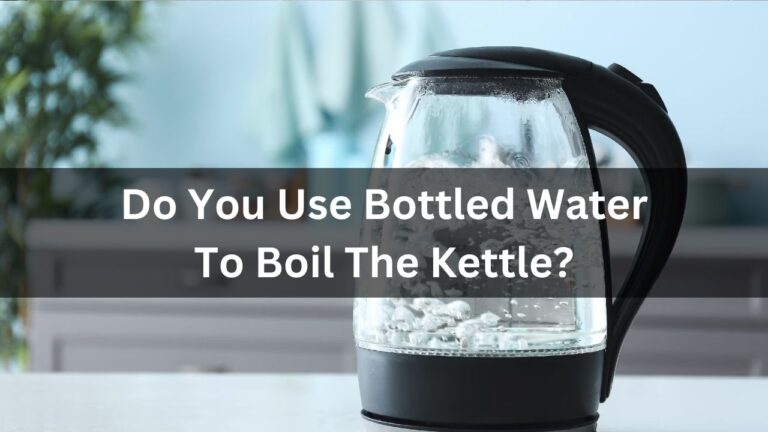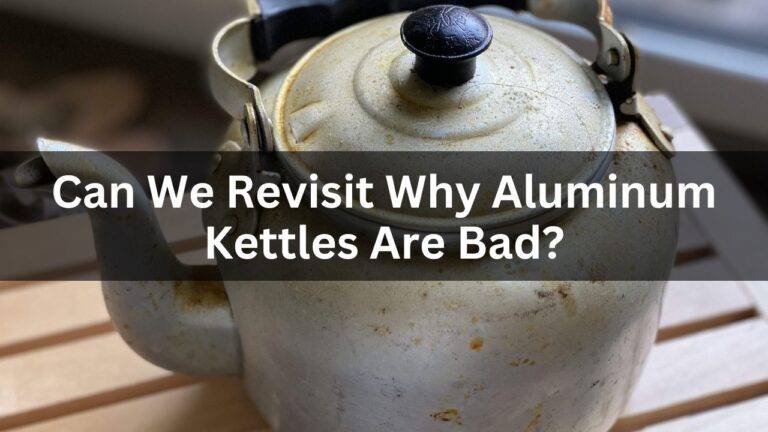Why Is My Kettle Making A High Pitched Noise?
The noise when boiling water in a my kettle is a minor thing. But have you ever noticed that with the passage of time, this noise becomes louder than usual? Have you ever tried to find out why?
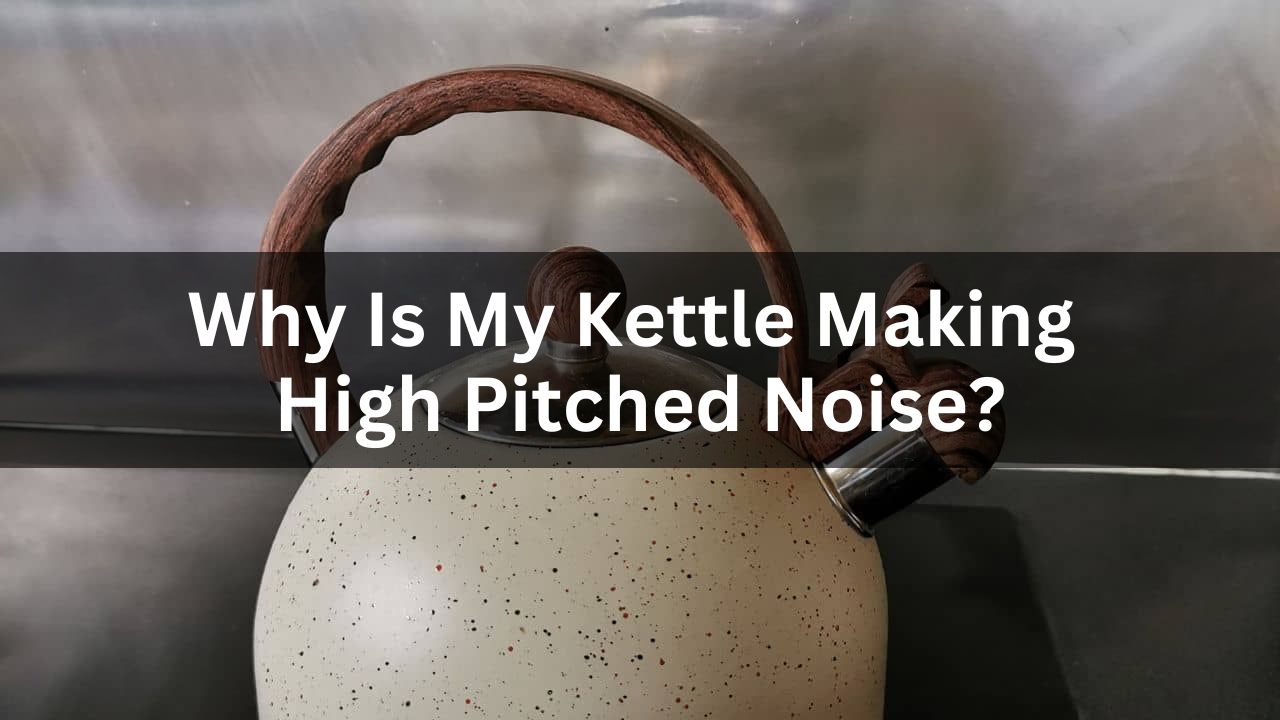
The noise when boiling water in a my kettle is a minor thing. But have you ever noticed that with the passage of time, this noise becomes louder than usual? Have you ever tried to find out why?
If not, don’t worry, this article will explain all the reasons for this high-pitched noise. The significant reason why kettlebells become louder over time is due to lime scaling.
Lime Scaling occurs due to calcium and magnesium present in hard water. When we constantly use hard water in the kettle and don’t clean it properly. The white crust starts forming in it. This white crust is termed a limescale layer.
This crust causes an inflow of heat. This hindrance causes louder sounds. This article will give you detailed answers to the high-pitched voice of the kettle. You can also get the idea of minimizing the noise of the kettle.
Contents
Is It Normal For A Kettle To Squeal?
It’s absolutely normal for a kettle to make a noise when water is boiling in it. The heating element transfers heat to water. Water present in the bottom changes into bubbles.
These hot bubbles are compressed by the cold water present in them. Due to this compression, these bubbles burst and make a very familiar sound. That’s why don’t worry if your kettle is producing this familiar sound.

But, if this voice changes from normal noise to louder noise then you should check your kettle. This louder noise is produced due to many reasons like mineral deposits, or debris.[1]
Also Read: Do You Use Bottled Water To Boil The Kettle?
Is Lime Scaling A Reason for a Kettle’s High Noise?
In case, we use hard or mineral water in the kettle, a white crust starts forming in it. This is called lime scaling. Many minerals including calcium and magnesium are present in hard water.
Hard water starts evaporating leaving behind the mineral deposits. These minerals form calcium and magnesium carbonates, which are white in color. These compounds form a layer in the kettle.
It affects the functioning of the kettle. It causes hindrances in the heating process of water. Due to this extra effort to heat the water, it produces irritating noise.
If you want to reduce this irritating noise, descale your kettle monthly. The high noise of the kettle could also be due to the malfunctioning of the kettle.[2]
Also Read: Why Are Kettles Not Efficient?
Which Kettle Makes More Noise: The Stove Top Or The Electric Kettle?
There is no doubt that a gas stove has higher energy than an electric stove. But wastage of energy is more in gas stove ranges.
That’s why electric stoves heat the kettle more quickly. The more quickly it is heated, the more bubbles burst.
It also has less curvature due to which many steam bubbles collapse when interacting with the wall. They don’t find space to leave the kettle. Due to this increased bursting of bubbles, more sound is produced.

Cold water also increases the noise. Because in case we use cold water in the kettle, water present in the bottom gets easily heated.
And it changes into bubbles. Due to the upper cold layer of water, it couldn’t find a way to escape and then collapse. This collapsing produces sound.[3]
Also Read: Is it allowed to have a kettle in my university accommodation?
Is High Noise A Sign Of Kettle’s Damage?
High noise is not always a sign of the kettle’s damage. As we know it can be due to limescale or some debris. If these materials are producing noise, you can easily reduce it by cleaning the kettle.
Sometimes the noise is also caused by not closing the kettle’s lid properly. If the noise does not go away after setting up all these things, then you should know that the noise is definitely coming from a faulty kettle.
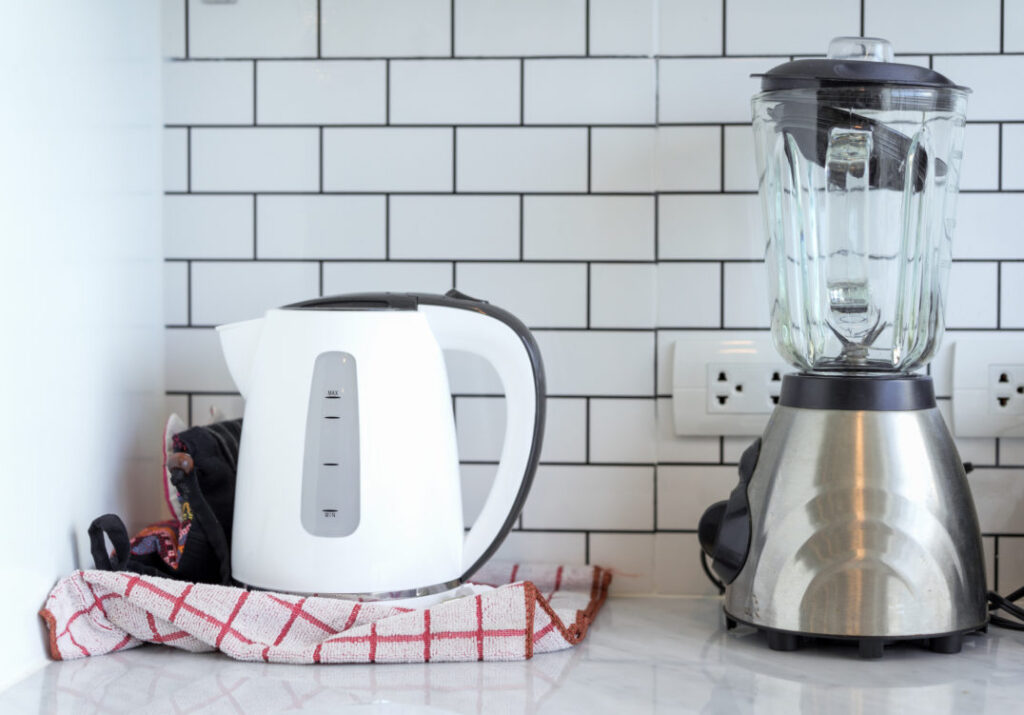
Then you should have it checked by a mechanic because then the noise must be due to a malfunction in it. You shouldn’t be careless about it.[4]
Also Read: Why Is My Kettle Making A Buzzing Sound?
Tips To Decrease The Noise Of A Kettle:
You can try the following tips to decrease the noise of the kettle.
- First, the main reason is limescale. Try to descale your kettle after every month. If you use hard water with a high percentage of minerals, descale it after a week.
- You can descale your kettle by using vinegar, lemon, and baking soda.
- You should use a soft scrubber to descale the kettle after using these materials.
- Cold water also increases the noise. So, try to use water at room temperature.
- If after descaling the noise didn’t decrease, take your kettle to the mechanic.[5]
Also Read: Is It Dangerous To Use A Rusty Kettle?
Conclusion:
The noise coming from the kettle during water boiling is a very common thing. As it is due to the bursting of bubbles that are compressed by upper cold water. But if the kettle is making more noise than normal, there could be several reasons for it.
One of the main reasons is lime scaling which occurs due to the usage of hard water. In this case, you can simply clean the kettle to reduce the noise. In case you don’t properly close the lid, it also produces noise. And sometimes the noise is due to malfunctioning of your kettle.
FAQs:
Q: Why is the sound produced during boiling water in the kettle?
A: The bursting of bubbles during boiling produces a specific sound. When we heat the kettle filled with water. The water present in the bottom changes into bubbles. These bubbles burst due to the compression of cold water.
Q: Are electric kettles noisy?
A: Well, every kettle makes a little noise while boiling water, but electric kettles make a little more noise than gas kettles. The main reason for this is its small curvature.
Bubbles form in the bottom and don’t find space to escape. These bubbles burst and produce sound. That’s why electric kettles are more noisy.
Q: What uses more energy electric kettle or stove top?
A: The stovetop has more energy than an electric stove. But wastage of energy is more in stove tops than electric. That’s why stove-top kettles use more energy and electric kettles are energy efficient.
Q: Does the high-pitched noise indicate a malfunction in the kettle?
A: Not necessarily. Some noise is normal, especially in kettles with boil-detection features or steam whistles. However, if the noise is excessive or accompanied by other issues, professional inspection may be required.
Q: Can scaling be the cause of the high-pitched noise?
A: Yes, scaling on the heating element can cause unusual noises during boiling. Regular descaling can help maintain the kettle’s performance and reduce noise.
Q: Is a high-pitched noise normal during kettle operation?
A: Yes, in many cases, a high-pitched noise is normal, especially if your kettle has a whistle function. It indicates that the water has reached boiling point.
Q: How can I reduce or eliminate the high-pitched noise from my kettle?
A: If the noise is bothersome, you can try reducing the heat slightly to slow down the boiling process. Additionally, keeping the kettle clean and free from mineral deposits may help minimize noise.
Q: Are there different types of high-pitched noises, and what do they indicate?
A: Yes, a whistling noise often indicates that the water has reached boiling point. Other high-pitched sounds may be due to vibrations, loose parts, or excessive steam pressure, and these could warrant further investigation.
Q: Should I be concerned if my kettle is consistently making a loud noise?
A: If the noise is within the normal range for your kettle type, there’s usually no cause for concern. However, if it’s an unusual or sudden change, it’s advisable to check for any visible issues or contact the manufacturer for guidance.
Q: Can hard water contribute to the high-pitched noise in my kettle?
A: Yes, mineral deposits from hard water can accumulate in the kettle, affecting its performance and potentially causing more noise. Regular descaling can help alleviate this issue.
Q: How often should I descale my kettle to reduce high-pitched noises?
A: It depends on the hardness of your water. In hard water areas, descale your kettle every few weeks to prevent mineral buildup, which can contribute to noise.
Q: Are there specific maintenance tips to prevent high-pitched noises in a kettle?
A: Regularly descale your kettle, clean it according to the manufacturer’s instructions, and inspect for any loose or damaged parts. Following these maintenance steps can help reduce high-pitched noises.
Q: If the high-pitched noise persists despite maintenance, what should I do?
A: If the noise is unusual or bothersome and persists after regular maintenance, contact the manufacturer for guidance or consider seeking professional assistance to ensure the kettle is in good working condition.
Q: What causes the high-pitched noise in my kettle when I’m boiling water?
A: The high-pitched noise is often a result of the steam produced during boiling. Kettles equipped with a whistle feature make this noise to alert you when the water reaches boiling point.
Q: What are the potential causes of a high-pitched noise in a kettle, and how can users identify specific factors such as heating element issues or pressure-related sounds contributing to the noise?
A: Explore various causes of a high-pitched noise in a kettle and provide guidance for users to identify factors like heating element issues or pressure-related sounds.
Q: Can limescale buildup inside the kettle contribute to high-pitched noises, and are there descaling methods or preventive measures users can employ to minimize such sounds?
A: Discuss how limescale buildup may contribute to high-pitched noises and suggest descaling methods or preventive measures for users to minimize such sounds.
Article You Might Be Interested:
Can I Put Cold Water In An Electric Water Kettle?
Is It Safe To Leave Tea Kettle Plugged In?
What Should You Not Do With An Electric Kettle?
Is Boiling Tea Bags In An Electric Kettle A Good Or Bad Idea?


